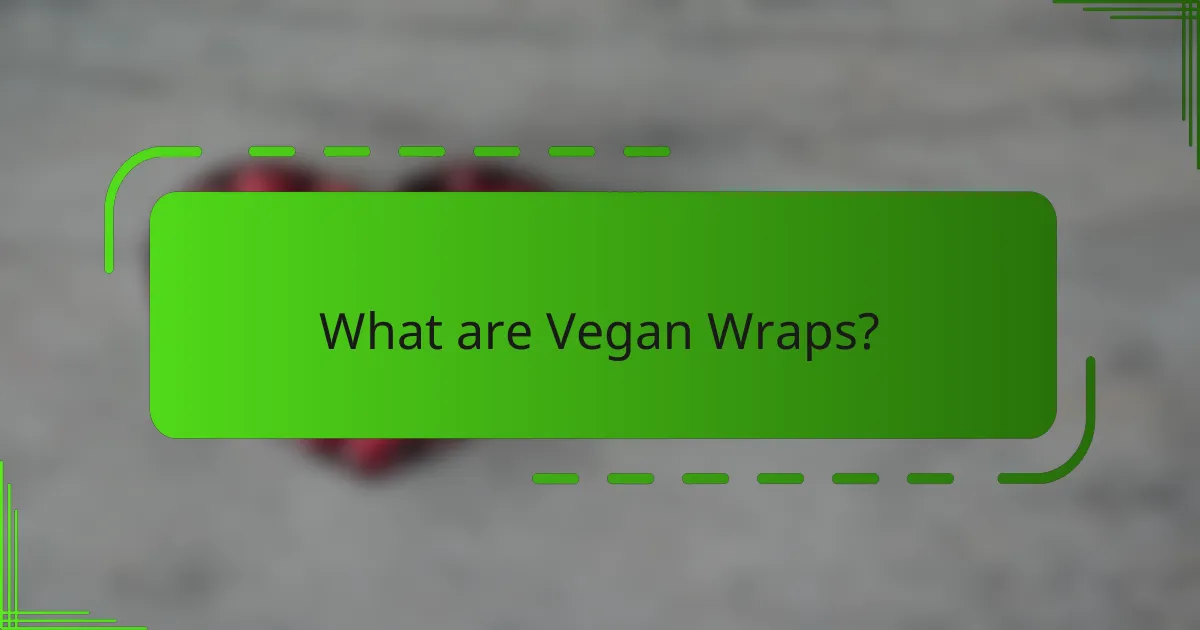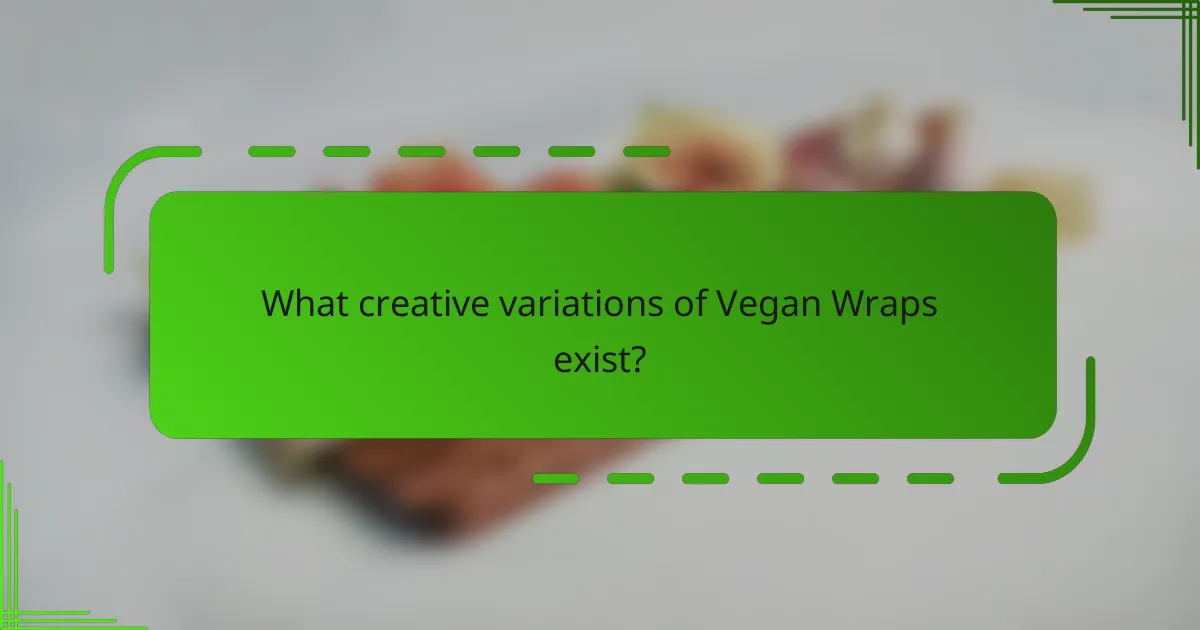Vegan wraps are a nutritious food option that consist of various plant-based ingredients, including vegetables, legumes, grains, and plant-based proteins, all wrapped in a tortilla or flatbread. They offer a versatile meal choice that can be served cold or warm, appealing to a range of dietary preferences. Common ingredients include lettuce, tomatoes, beans, and hummus, while creative variations such as Mediterranean, Thai peanut, and BBQ jackfruit wraps provide unique flavor profiles. To enhance the nutritional value of vegan wraps, incorporating fresh ingredients, protein sources, and healthy fats is recommended. Pairing wraps with sides like soup or salad can create a balanced meal experience.

What are Vegan Wraps?
Vegan wraps are a type of food that consists of various plant-based ingredients wrapped in a tortilla or flatbread. These wraps typically include vegetables, legumes, grains, and plant-based proteins. Common ingredients are lettuce, tomatoes, cucumbers, beans, and hummus. Vegan wraps are often enjoyed as a healthy, convenient meal option. They can be served cold or warm, depending on the ingredients used. The versatility of vegan wraps allows for a wide range of flavor combinations. They cater to various dietary preferences and can be customized easily. This makes them a popular choice in vegan and vegetarian diets.
How are Vegan Wraps different from traditional wraps?
Vegan wraps differ from traditional wraps primarily in their ingredients. Vegan wraps contain no animal products, relying on plant-based fillings such as vegetables, legumes, and vegan proteins. Traditional wraps often include meat, dairy, or eggs as key components. This makes vegan wraps suitable for those following a vegan lifestyle or looking to reduce animal product consumption. Additionally, the sauces and spreads in vegan wraps are typically plant-based, while traditional wraps may use mayonnaise or cheese. The nutritional profiles also vary; vegan wraps often have lower saturated fats and cholesterol. This is backed by studies indicating that plant-based diets can reduce heart disease risk.
What ingredients define a Vegan Wrap?
A vegan wrap typically includes a tortilla or flatbread filled with plant-based ingredients. Common ingredients are fresh vegetables, such as lettuce, tomatoes, and cucumbers. Protein sources often include beans, lentils, or tofu. Avocado or hummus is frequently used for creaminess. Additionally, herbs and spices enhance flavor, with options like cilantro or cumin. Vegan wraps avoid any animal products, aligning with a plant-based diet. The combination of these ingredients creates a nutritious and satisfying meal option.
What types of wraps can be used for Vegan Wraps?
Tortilla wraps, lettuce leaves, rice paper, and collard greens can be used for vegan wraps. Tortilla wraps are versatile and can be made from whole wheat, corn, or gluten-free grains. Lettuce leaves provide a low-carb option and add crispness. Rice paper is great for fresh rolls and adds a chewy texture. Collard greens are sturdy and can hold substantial fillings. Each type of wrap offers different flavors and textures, enhancing the overall vegan wrap experience.
What are the key ingredients in Vegan Wraps?
Key ingredients in vegan wraps include tortillas, vegetables, and plant-based proteins. Tortillas serve as the base for wraps. Common vegetables are lettuce, tomatoes, cucumbers, and bell peppers. Plant-based proteins include chickpeas, tofu, or tempeh. Additional ingredients may consist of hummus, avocado, or vegan cheese for flavor. These ingredients provide essential nutrients and variety. Vegan wraps are versatile and can accommodate different tastes and dietary needs.
What vegetables are commonly used in Vegan Wraps?
Common vegetables used in vegan wraps include lettuce, spinach, bell peppers, cucumbers, carrots, and avocado. Lettuce and spinach provide a fresh base. Bell peppers add crunch and sweetness. Cucumbers contribute hydration and a crisp texture. Carrots offer a natural sweetness and vibrant color. Avocado adds creaminess and healthy fats. These vegetables enhance flavor and nutrition in vegan wraps.
How do legumes and grains contribute to Vegan Wraps?
Legumes and grains provide essential nutrients and texture in vegan wraps. Legumes, such as beans and lentils, are rich in protein and fiber. They enhance the nutritional profile of wraps, making them more filling. Grains, like quinoa and brown rice, offer carbohydrates and additional fiber. This combination supports energy levels and digestive health. Together, legumes and grains create a balanced meal option. They also contribute to the overall taste and mouthfeel of wraps. The diverse flavors and textures make vegan wraps more appealing and satisfying.
What sauces and spreads enhance the flavor of Vegan Wraps?
Vegan wraps can be enhanced with various sauces and spreads. Common options include hummus, which adds creaminess and protein. Avocado spread offers healthy fats and a rich texture. Salsa brings a fresh, zesty flavor to wraps. Tahini provides a nutty taste and is rich in calcium. Vegan mayonnaise adds a creamy consistency without eggs. Pesto, made from basil and nuts, gives a vibrant flavor. Barbecue sauce introduces a smoky sweetness. Each of these enhances the overall flavor profile of vegan wraps, making them more enjoyable.
What are the health benefits of Vegan Wraps?
Vegan wraps provide numerous health benefits. They are typically rich in vitamins, minerals, and fiber. Ingredients like whole grains, vegetables, and legumes contribute to a balanced diet. These wraps can support weight management due to their lower calorie content compared to traditional wraps.
Vegan wraps are often low in saturated fat, promoting heart health. They can also reduce the risk of chronic diseases such as diabetes and hypertension. The inclusion of plant-based proteins helps in muscle repair and growth.
Additionally, vegan wraps are versatile, allowing for a variety of nutrient-dense fillings. This enables individuals to customize their intake based on dietary needs. Overall, vegan wraps serve as a nutritious option for those seeking healthier meal alternatives.
How do Vegan Wraps support a balanced diet?
Vegan wraps support a balanced diet by providing essential nutrients through diverse ingredients. They typically include whole grains, which offer fiber and complex carbohydrates. Vegetables in vegan wraps supply vitamins, minerals, and antioxidants. Legumes and plant-based proteins contribute necessary amino acids and additional fiber. Healthy fats can be added through ingredients like avocados or nuts. These components work together to enhance satiety and maintain energy levels. Studies indicate that plant-based diets can lower the risk of chronic diseases, supporting the health benefits of vegan wraps.
What nutrients are typically found in Vegan Wraps?
Vegan wraps typically contain a variety of essential nutrients. These wraps often include whole grains, which provide fiber and B vitamins. Leafy greens are common ingredients, offering vitamins A, C, and K. Legumes, such as beans or lentils, contribute protein and iron. Nuts and seeds may be added for healthy fats and additional protein. Many vegan wraps also incorporate vegetables, supplying antioxidants and various minerals. The combination of these ingredients creates a nutrient-dense meal option.
How do Vegan Wraps contribute to weight management?
Vegan wraps contribute to weight management by being low in calories and high in nutrients. They typically contain vegetables, whole grains, and plant-based proteins. These ingredients provide fiber, which promotes satiety and reduces overall calorie intake. Research indicates that high-fiber diets can aid in weight loss by enhancing feelings of fullness. Additionally, vegan wraps are often lower in saturated fats compared to animal-based options. This can lead to a healthier weight profile. By substituting traditional wraps with vegan options, individuals can enjoy satisfying meals while managing their caloric consumption effectively.

What creative variations of Vegan Wraps exist?
Creative variations of vegan wraps include Mediterranean wraps, Thai peanut wraps, and BBQ jackfruit wraps. Mediterranean wraps often contain hummus, roasted vegetables, and olives. Thai peanut wraps feature tofu, shredded carrots, and a spicy peanut sauce. BBQ jackfruit wraps utilize shredded jackfruit, coleslaw, and BBQ sauce. Other variations include falafel wraps, which include falafel balls, lettuce, and tahini sauce. Mexican-inspired wraps often combine black beans, corn, and avocado. Each variation offers unique flavors and textures, appealing to diverse palates.
How can Vegan Wraps be customized for different diets?
Vegan wraps can be customized for different diets by altering their ingredients. For gluten-free diets, use gluten-free wraps made from rice or corn. For low-carb diets, opt for lettuce wraps instead of traditional tortillas. High-protein variations can include additional legumes or tofu as fillings. For raw diets, incorporate fresh vegetables and raw nut spreads. To cater to nut-free diets, substitute nut-based spreads with seed butters like sunflower seed butter. Each of these modifications maintains the vegan aspect while accommodating specific dietary needs.
What are some popular flavor combinations for Vegan Wraps?
Popular flavor combinations for vegan wraps include hummus with roasted vegetables. This combination offers a creamy texture with savory flavors. Another popular mix is avocado with black beans and corn. This pairing provides a rich taste and added protein. Spinach with tofu and sesame dressing is also favored for its freshness and crunch. Additionally, a combination of peanut butter with banana and spinach creates a sweet and nutritious option. These flavors are commonly used due to their complementary tastes and health benefits.
How can seasonal ingredients be incorporated into Vegan Wraps?
Incorporating seasonal ingredients into vegan wraps enhances flavor and nutrition. Seasonal vegetables like bell peppers in summer or squash in fall provide freshness. Herbs such as basil in summer and thyme in winter add aromatic qualities. Fruits like strawberries or peaches can be included for a sweet contrast. Using grains like quinoa or farro, which can be harvested seasonally, adds texture. Additionally, local sourcing of ingredients ensures peak ripeness and sustainability. This practice supports local farmers and reduces carbon footprint. Seasonal ingredients also align with dietary trends emphasizing whole foods.
What are some unique Vegan Wrap recipes to try?
Mediterranean Chickpea Wrap is a unique vegan wrap recipe. It includes chickpeas, cucumbers, tomatoes, and a tahini dressing. Another option is the Sweet Potato and Black Bean Wrap. This wrap features roasted sweet potatoes, black beans, and avocado. A third unique recipe is the Thai Peanut Tofu Wrap. It combines marinated tofu, shredded carrots, and a spicy peanut sauce. Lastly, consider the Hummus and Veggie Wrap. It includes hummus, bell peppers, spinach, and olives. These recipes offer diverse flavors and nutritious ingredients, making them excellent choices for vegan wraps.
How do you make a Mediterranean-inspired Vegan Wrap?
To make a Mediterranean-inspired vegan wrap, start with a large whole grain or spinach tortilla. Spread hummus evenly over the tortilla for flavor and moisture. Layer fresh spinach, sliced cucumbers, diced tomatoes, and red onion on top. Add Kalamata olives and artichoke hearts for a classic Mediterranean touch. Sprinkle with feta-style vegan cheese for added creaminess. Drizzle with olive oil and a squeeze of lemon juice for brightness. Roll the tortilla tightly, securing the filling, and slice it in half for serving. This wrap combines fresh vegetables and Mediterranean flavors, making it both nutritious and delicious.
What ingredients are used in a spicy Vegan Wrap?
A spicy Vegan Wrap typically includes ingredients such as whole grain tortillas, spicy hummus, bell peppers, avocado, and spinach. Additional ingredients may consist of jalapeños, black beans, corn, and a variety of spices like cayenne or chili powder. These components create a flavorful and nutritious meal option. Whole grain tortillas provide fiber, while spicy hummus adds protein and creaminess. Bell peppers and spinach contribute vitamins and minerals. Jalapeños enhance spiciness, and black beans offer additional protein. This combination results in a satisfying and healthful wrap.

How can you make the most out of Vegan Wraps?
To make the most out of vegan wraps, focus on using a variety of fresh, colorful ingredients. Incorporate leafy greens, such as spinach or kale, for added nutrients. Use a protein source like chickpeas, tofu, or tempeh to enhance satiety. Add vibrant vegetables like bell peppers, cucumbers, and carrots for texture and flavor. Include healthy fats, such as avocado or hummus, to improve taste and nutrition. Experiment with different wraps, like whole grain or gluten-free options, to suit dietary preferences. Season with herbs and spices to elevate the flavor profile. Lastly, consider pairing wraps with a side of soup or salad for a balanced meal.
What tips can enhance the preparation of Vegan Wraps?
To enhance the preparation of vegan wraps, use fresh and diverse ingredients. Incorporate a variety of vegetables for texture and flavor. Leafy greens like spinach or kale add nutritional value. Use hummus or avocado as a spread for creaminess. Season ingredients with herbs and spices to elevate taste. Choose whole grain or gluten-free wraps for added health benefits. Prepare ingredients in advance for quick assembly. Lastly, cut wraps diagonally for an appealing presentation.
How do you properly store Vegan Wraps for freshness?
To properly store vegan wraps for freshness, wrap them tightly in plastic wrap or foil. This prevents air exposure, which can lead to drying out. Place the wrapped vegan wraps in an airtight container or a resealable plastic bag. Store them in the refrigerator to maintain their freshness. Consuming them within three to five days is recommended for optimal taste and texture. Proper storage helps retain the ingredients’ flavors and prevents spoilage.
What are some common mistakes to avoid when making Vegan Wraps?
Common mistakes to avoid when making vegan wraps include using dry ingredients. Dry ingredients can lead to a bland taste and lack of moisture. Another mistake is overfilling the wrap. Overfilling can make it difficult to roll and cause spills. Not properly seasoning the ingredients is also a common error. Seasoning enhances flavor and makes the wrap more enjoyable. Additionally, using the wrong type of wrap can affect texture and taste. Whole grain or spinach wraps often provide better flavor and nutrition. Lastly, not allowing ingredients to cool before wrapping can result in sogginess. Properly cooling ingredients maintains the wrap’s integrity.
What are some serving suggestions for Vegan Wraps?
Vegan wraps can be served in various ways to enhance their appeal. Consider pairing them with a side of fresh fruit for a refreshing contrast. Serving with a homemade vegan dip, like hummus or guacamole, adds flavor. You can also slice the wraps into pinwheels for a fun presentation. Adding a sprinkle of seeds or nuts can provide extra texture. For a more substantial meal, serve with a side salad. Wrapping in parchment paper can make them easy to eat on the go. Finally, consider warming the wraps slightly to enhance the flavors of the ingredients inside.
Vegan wraps are a nutritious meal option made from various plant-based ingredients wrapped in tortillas or flatbreads, including vegetables, legumes, grains, and plant-based proteins. This article explores the differences between vegan and traditional wraps, key ingredients, health benefits, and how to customize them for different dietary needs. Additionally, it highlights creative variations, popular flavor combinations, and tips for preparation and storage, ensuring a comprehensive understanding of vegan wraps as a versatile and healthy food choice.